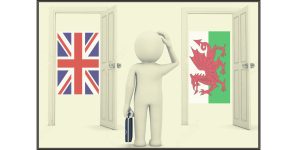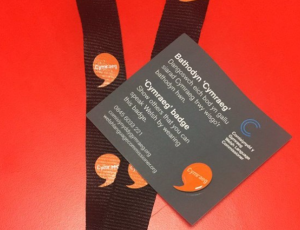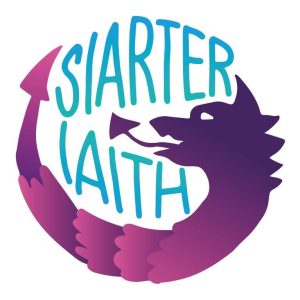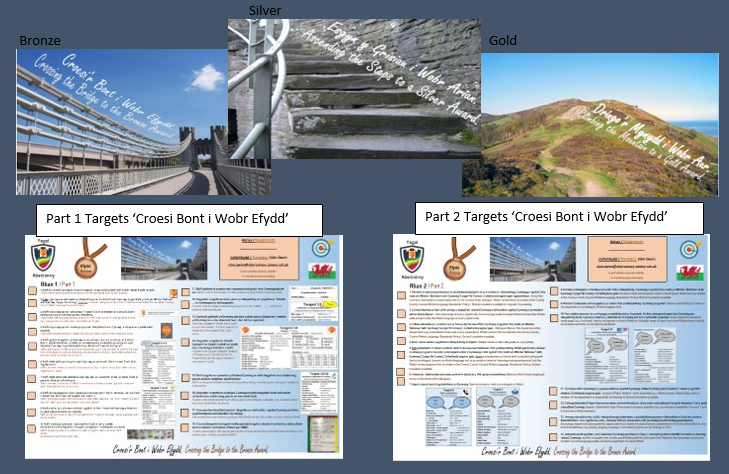Welsh Language Charter
The Welsh Language is Alive at Ysgol Aberconwy!
Our Belief
The Welsh language belongs to us all, fluent speakers, learners or those who are shy about their Welsh. It’s ours. It’s our place to look after it for future generations. Therefore, join us on the journey to a million speakers by 2050!
What does the Welsh Curriculum say?
Expressing ourselves through language is key to communication. Languages connect us. Understanding languages is key to understanding the world around us.
What does being bilingual mean?
It’s the ability to live your everyday life in two languages. That’s what we at Ysgol Aberconwy are eager to offer our students.
2 Languages = Opens 2 Doors

What are the Advantages of Bilingualism?
Access to two cultures / Security in identity / Communicating with the whole family and community
The Welsh language is one of the few things that differentiates Wales from the rest of the UK and it can be a powerful link between Welsh people everywhere. Everyone in Wales and from Wales can be proud of the language, even if they don’t speak it. It belongs to us all.
One of the advantages of being bilingual is having access to two cultures, which can be two different worlds of experience. The Welsh language brings a wealth of idioms and sayings, folk stories and history, poetry, literature and music, both traditional and contemporary, and a different understanding of the world.
Where parents have different first languages, a child who is bilingual can communicate in both of those languages. A close and special relationship with each parent will develop. The child inherits part of their parents’ past and heritage. Being bilingual creates a bridge between generations, with grandparents, for example, or with other family members. This helps to build a sense of belonging to the extended family. Being able to speak Welsh also allows people to play a full part in community life.
Educational benefits / Easier to learn another language / Extending the enjoyment of reading and writing
Research evidence from bilingual education systems in Canada, the United States, the Basque country, Catalonia and Wales shows that children who have two languages tend to do better in the curriculum and show higher performance in tests and examinations. This is partly related to the thinking advantages of bilingualism. There is growing evidence from European research that bilinguals tend to find it easier to learn other languages. The current examples are children from countries such as Holland, Denmark and Finland who often speak three (or four) languages with ease. Another example is the Basque country where learning Basque, Spanish and English has become increasingly frequent.
If someone can read and write in two languages, they are able to enjoy two literatures in their original language. It opens a deeper understanding of different traditions, ideas, ways of thinking and behaving. The pleasures of reading novels, poetry and magazines and the enjoyment of writing to friends and family are all doubled for bilingual people.
Employment advantages
There are economic advantages in Wales (which are continually increasing) of being bilingual. A person with two languages has a wider choice of jobs available in the future. Welsh speakers are increasingly needed in the retail sector, tourism, transport, public relations, banking and accountancy, administration, translation, secretarial work, marketing and sales, the law and teaching. Being bilingual gives a person an additional valuable skill when job seeking.
Health advantages / raised self-esteem / thinking benefits / tolerance of other languages and cultures
Being able to switch naturally between languages, and being able to talk to different people in those languages, makes children feel good about themselves and their abilities. A sense of real ownership of both Welsh and English can do wonders to help raise a child’s self-esteem.
Research has shown that having two well developed languages can give people advantages in thinking. There are four main areas:
- Creative thinking – bilingual children have two or more words for each object and idea. When different meanings are attached to words in the two languages, a bilingual person may develop the ability to think more flexibly.
- Sensitivity to communication – bilingual people have to know which language to speak with whom, and when. They therefore appear to be more sensitive to the needs of listeners than monolingual people.
- IQ tests – research from many different countries of the world shows that bilingual people tend do better at IQ tests compared with monolingual people of the same socio-economic class.
- A head start in reading – bilinguals being less fixed on the sound and more centred on the meaning of words has been shown by Canadian researchers to give a head start in learning to read. This tends to be an advantage for bilingual children around the ages four to six.
Because two languages give someone a wider cultural experience, there is often a greater tolerance of differences in cultures, creeds and customs. Bilingual people look at the world differently.
(Emeritus Professor of Education, Colin Baker, Bangor University research)
How do we teach Welsh at Ysgol Aberconwy?
Here at Ysgol Aberconwy, we offer two Welsh courses: Welsh Second Language and Welsh First Language.
If your child has been to Welsh medium primary school, or in the Welsh language stream or attended a naturally Welsh/bilingual school, then they will be given the opportunity to study Welsh to a first language level. If your child has been to an English medium school and has made real progress in Welsh, bridging from second language to first language is a real possibility.
Every other student will follow the Welsh Second Language course. We are extremely proud of the Welsh Department’s yearly GCSE results which are consistently higher than the national average.
LLC (Llugwy Castell) Form Class
‘LLC’ is the ‘Welshest’ form class. The students who follow the Welsh First Language course, the students ‘bridging to first language’ and the More Able and Talented (MAT) Second Language students are put in this form class. A fluent Welsh speaking teacher is appointed to the form class and is responsible for communicating in Welsh with those students every morning during tutorial. They also communicate in Welsh during Personal, Social and Health Education (PSHE). The teachers will encourage your child to communicate in Welsh and use their Welsh language skills.
How can you help?
Encourage your child to speak Welsh:
- At home and at school
- Whilst socialising with family and friends
- When speaking on the phone and texting
- In shops / and on the high street
- Explain to your child the advantages of bilingualism.
Some useful resources:
How does school help?
To help your child to use their Welsh, fluent staff and learners wear black ‘lanyards’ with orange speech bubbles on them. Encourage your child to converse with a variety of members of staff in Welsh!

Tools for Learning Welsh & Welsh Resources
Siarter Iaith Cymraeg Campus Uwchradd
Siarter Iaith Cymraeg Campus Uwchradd (or Welsh Language Charter for Secondary Schools) is a scheme that provides a clear framework to promote and increase the use of the Welsh language amongst children and young people.
The charter’s main aim is to promote a strong Welsh ethos and to provide clear guidance concerning the Welsh language within secondary schools, in the hope it will inspire children and young people to use the language in every aspect of their lives.

There are three awards to work for the Bronze, Silver and the Gold.
In order to support the three Siarter Iaith Uwchradd awards, Ysgol Aberconwy has created a unique target system for the school to challenge and award teachers and different departments for using the Welsh language in lessons and for encouraging their students to use their Welsh language skils outside of their Welsh lessons. We have used local landmarks as a symbol of reaching specific goals. ‘Croesi’r Bont i Wobr Efydd’ (Crossing the Bridge to a Bronze Award), ‘Esgyn y Grisiau i Wobr Arian’ (Ascending the Steps to a Silver Award) a ‘Dringo’r Mynydd i Wobr Aur’ (Climbing the Mountain to a Gold Award) – the Suspension Bridge, the Castle Walls and Mynydd y Dref (Conwy Mountain).











